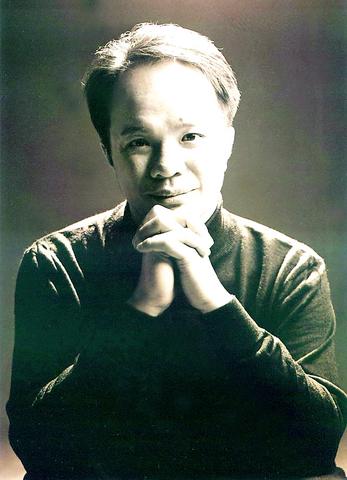Not many 10-year-olds tickle the ivories as symphony soloists, so after Tainan-born Rueibin Chen (陳瑞斌) did so in 1978 with the Taipei Symphony Orchestra, big things were expected of him.
At 13, Chen moved to Vienna, obtaining a concert diploma and a subsequent soloist's examination award in Hanover, Germany, before going on to take master classes under Murray Perahia. He has since collected a mantle of highly prized awards, including Vienna's Boesendorfer Prize in 1983, Paris' Albert Roussel Prize in 1991 and Taiwan's own "best arts performance" prize in 2000.
That was the last time Chen played in Taiwan and he's making a welcome return in a series of three concerts starting in Taipei tomorrow, Nov. 9, then moving to Taichung on Friday, Nov. 11 and returning home to Tainan on Friday, Nov. 15.

PHOTO COURTESY OF MUSICPOWER
"The pressure playing in Tainan is intense compared with Taipei," Chen said in a telephone interview at the end of a full day of rehearsing. "The audiences there are more conservative, more accustomed to traditional Taiwanese entertainment than they are to classical music.
"Besides, my parents are there," he added laughing. "That makes it really intense."
To hear Chen admit stage freight seems unusual for a musician of his caliber. Since his European debut in 1984 at the Vienna Koncerthaus, he has performed non-stop at one festival after another: the International Salzburg Music Festival, the Vienna Spring Festival, the Schleswig-Holstein Music Festival, the Hong Kong Festival, the International Rachmaninoff Music Festival in Moscow and the Taipei Music Festival, where he performed for the first time Rachmaninoff's complete concertos.
In 1989 he was selected "best young artist" by Taiwan's Ministry of Culture. Three years later, he was asked by then president Lee Teng-hui (李登輝) to play at the Presidential Palace in a festival concert that was broadcast across the nation. He's won international piano competitions in Warsaw, Tel Aviv, Athens, Vienna, Rome and even played for former Israeli president Itzhak Rabin.
"2000 was the last time I played as a soloist in Taiwan," Chen said.
"Before then, I had the honor of accompanying the Taipei Symphony Orchestra as piano soloist on their 1998 tour of Asia."
Chamber music is another area in which Chen excels. He has performed with well-known groups like the Shanghai Quartet and Lark Quartet. So can Taiwan audiences expect a song or two at any of his concerts? "No, no, no," he says. "No singing. Strictly piano."
Rueibin Chen plays the Taipei National Concert Hall (台北國家音樂廳) tomorrow night at 7:45pm. Performances at Taichung's Chungshan Hall (台中中山堂) and the Tainan City Arts Center (台南市立藝樹中心) both begin at 7:30pm. Tickets are available online at http://www.ticket.com.tw or by calling the venues; Taipei (02) 2341-9898, Taichung (04) 2292-5321, Tainan (06) 214-9441.

One of the biggest sore spots in Taiwan’s historical friendship with the US came in 1979 when US president Jimmy Carter broke off formal diplomatic relations with Taiwan’s Republic of China (ROC) government so that the US could establish relations with the People’s Republic of China (PRC). Taiwan’s derecognition came purely at China’s insistence, and the US took the deal. Retired American diplomat John Tkacik, who for almost decade surrounding that schism, from 1974 to 1982, worked in embassies in Taipei and Beijing and at the Taiwan Desk in Washington DC, recently argued in the Taipei Times that “President Carter’s derecognition

This year will go down in the history books. Taiwan faces enormous turmoil and uncertainty in the coming months. Which political parties are in a good position to handle big changes? All of the main parties are beset with challenges. Taking stock, this column examined the Taiwan People’s Party (TPP) (“Huang Kuo-chang’s choking the life out of the TPP,” May 28, page 12), the Democratic Progressive Party (DPP) (“Challenges amid choppy waters for the DPP,” June 14, page 12) and the Chinese Nationalist Party (KMT) (“KMT struggles to seize opportunities as ‘interesting times’ loom,” June 20, page 11). Times like these can

You can tell a lot about a generation from the contents of their cool box: nowadays the barbecue ice bucket is likely to be filled with hard seltzers, non-alcoholic beers and fluorescent BuzzBallz — a particular favorite among Gen Z. Two decades ago, it was WKD, Bacardi Breezers and the odd Smirnoff Ice bobbing in a puddle of melted ice. And while nostalgia may have brought back some alcopops, the new wave of ready-to-drink (RTD) options look and taste noticeably different. It is not just the drinks that have changed, but drinking habits too, driven in part by more health-conscious consumers and

Dr. Y. Tony Yang, Associate Dean of Health Policy and Population Science at George Washington University, argued last week in a piece for the Taipei Times about former president Ma Ying-jeou (馬英九) leading a student delegation to the People’s Republic of China (PRC) that, “The real question is not whether Ma’s visit helps or hurts Taiwan — it is why Taiwan lacks a sophisticated, multi-track approach to one of the most complex geopolitical relationships in the world” (“Ma’s Visit, DPP’s Blind Spot,” June 18, page 8). Yang contends that the Democratic Progressive Party (DPP) has a blind spot: “By treating any